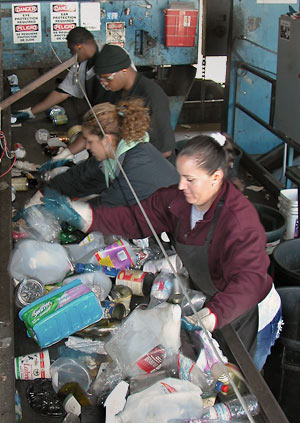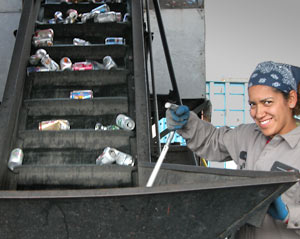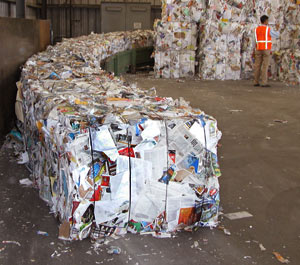Who we are, what we do



Community Conservation Centers (CCC) has been operating Berkeley Recycling at Second and Gilman Streets in Berkeley since September 1982. CCC operates programs that buy recyclables and provides for convenient drop-off of recyclables. The City-owned facility is also home to the Ecology Center, which operates the residential curbside pick-up program. The City of Berkeley operates the commercial pick-up program which collects recyclables from commercial establishments throughout the city. Together, the three programs collect about 18,000 tons per year of various materials, including newspaper, cardboard, glass and plastic bottles, scrap metals and household hazardous waste. The following are programs operated by CCC.
The Buyback pays for certain recyclables that you bring to Berkeley Recycling at Second and Gilman Streets in Berkeley. See Buyback to learn which materials will be purchased, as well as current prices. See Materials Preparation requirements so you can prepare your materials before you arrive at the scales.
The Drop-off is at the corner of Second and Gilman Streets in Berkeley; enter the main gate on Second Street and turn left to find the drop-off bins for recycling your materials. See Drop-Off to learn which materials are accepted, and see Materials Preparation Requirements so you know how to prepare your materials for drop-off.
CCC sponsors an Accounts Program that allows you to raise money for yourself or a group! Register for an Account at the Buyback and ask your friends and associates to donate the sale of their recyclables to your account. Then get a check every month!
What is MRF?
CCC also operates the Materials Recovery Facility (MRF) established by the City in 1991 as part of its strategy to achieve 50 percent recycling by 2000. The MRF processes all recyclables collected by the residential curbside, the commercial pick-up, buyback and drop-off recycling programs. Recyclables delivered to CCC from EC and City trucks are processed to remove contaminants, to sort into salable commodities and to prepare for shipment to market. Scrap and redemption revenues from the sale of these recyclable materials generates about $5.0 million per year in revenues that support Berkeley’s recycling programs.
An MRF “processes” recyclables that are collected in trucks where everything gets thrown in together. CCC receives about 1,100 tons per month of recyclables from EC’s residential curbside program and the City’s commercial program: These materials are delivered in two streams: one stream is fibers which are sorted into cardboard, mixed paper and newspaper; and the other stream is containers which are sorted into aluminum cans, glass bottles, plastic and tin. These mixed (commingled) recyclables have no value when they are delivered to the MRF, and must be turned into valuable commodities that can be sold at market.
First, all contaminants (non-recyclable items) are removed and then the materials are sorted into recyclable commodities. Once materials are separated into clean, marketable commodities, most are baled (compacted into bales that can be handled for storage) and transported to market. All of these activities together are called “processing,” and that is what a MRF does.
CCC operates the only MRF in Berkeley, and handles all of the recyclables collected in the City of Berkeley’s recycling programs. At the present time, CCC processes about 1,625 tons per month of recyclables at the Berkeley Recycling Center, which includes the materials collected at CCC’s buyback and drop-off.
Fiber stream sorting
CCC uses an elevated fiber sorting system that sorts large quantities of commingled fibers into the three recyclable categories for compacting into bales which are loaded into containers for transporting. Most fibers are exported from the Oakland port for shipment to various international destinations.
Container stream sorting
CCC use a container sorting system that removes contaminants and separates commingled containers into ten different categories: aluminum cans; bi-metal cans; tin cans; aluminum foil; brown, green, clear and 3-mix glass; PET and HDPE plastic.
All materials except glass are temporarily stored in forklift and roll-off bins for later compacting into bales for transport to market. Glass is sorted into four large bays by color and trucked directly to market.
Baling
Baling is the heart of CCC's processing operation, baling about 80 percent of all recyclables handled at the center. CCC bales about 16,000 tons per year of fibers and containers which equals about 25,000 bales per year which have to be stored by commodity for later loading onto trucks for shipment to market. Without baling, these materials could not be handled for storing, loading and transporting.